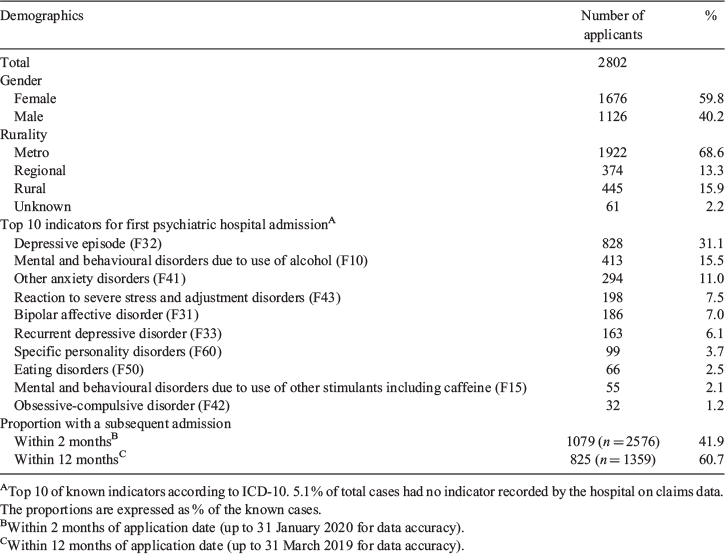Private health insurance reforms: impact of the psychiatric care waiting period exemption policy
Catherine Keating A , Sarah Rowley A C and Andrew Wilson B
A C and Andrew Wilson B
A Medibank, Level 2, 720 Bourke Street, Docklands, Melbourne, Vic. 3008, Australia. Email: catherine.keating@medibank.com.au
B Medibank, Level 11, 259 George Street, Sydney, NSW 2000, Australia. Email: andrew.wilson@medibank.com.au
C Corresponding author. Email: sarah.rowley@medibank.com.au
Australian Health Review 45(4) 519-520 https://doi.org/10.1071/AH20357
Submitted: 15 December 2020 Accepted: 15 December 2020 Published: 2 March 2021
Abstract
Younger people are more likely to experience incident mental health conditions and hold lower levels of private health insurance coverage. Government reforms introduced in 2018 enabled customers to avoid 2-month waiting periods to access mental health hospital care. Effectiveness in reducing time to admission is assessed.
On 1 April 2018, The Australian Department of Health introduced private health insurance reforms to make it easier for policy holders to access mental health services when they are needed.1 From this date, patients with limited cover for psychiatric care have been able to upgrade their cover to include in-hospital psychiatry treatment and access mental health care without serving a 2-month waiting period. The goal of the waiting period exemption was to make it easier for patients to access timely care, without facing substantial out-of-pocket costs.
Uptake of the psychiatric care waiting period exemption is reported quarterly by each health fund to Government. National uptake for the most recent quarter (1 July to 30 September) was 1648 persons.2 Although the policy uptake is well known, to our knowledge, it has not yet been assessed whether the policy reform achieved its goal of enabling more timely access to in hospital mental health care. In this letter, we analyse Medibank Group data to determine the profile of the applicants, how quickly they accessed in-hospital psychiatry care and the hospital days enabled by the policy.
Mental health hospital claims data for the Medibank Group (Medibank and ahm) were analysed for the 1-year period 1 April 2018 to 31 March 2020. A member was defined as having ‘used’ the exemption policy if they applied for the exemption, upgraded their cover to include psychiatric care benefits, and made a claim for mental health-related treatment within the following 2 months (previously this would have been the waiting period). Reasons for hospital admission were assessed based on International Statistical Classification of Diseases and Related Health Problems, Tenth Revision, Australian Modification (ICD-10-a.m.) codes.3 These data were not reported for 5.0% of claims; therefore, reasons for admission are reported as a proportion of cases with a known indication.
During the first 2 years of the policy, 2802 Medibank Group members used the waiting period exemption. Uptake was immediate, with 100 members using the exemption in April 2018, and per capita utilisation relatively stable thereafter. Applicants came from at least 955 unique residential post codes, represented all Australian states and territories, and were admitted to 122 unique hospitals, demonstrating broad uptake. The profile of members is shown in Table 1.

|
The median number of days between applying for the exemption and the first hospital psychiatric admission was four (mean 8.0, 95%CI 7.6–8.4). The mean length of stay of the first admission was 18.2 days (95%CI 17.6–18.7, range 1–118), with the majority (90.0%, n = 2523) overnight, reflecting a high acuity of patients. The leading reasons for admission were depressive episode, mental and behavioural disorders due to use of alcohol, other anxiety disorders, reaction to severe stress and adjustment disorders, and bipolar affective disorder. The proportion of young people (aged <40 years) was 50.9% and the mean age was 41 years. Females were over-represented.
In the 2 years post implementation, the exemption policy enabled 62 388 hospital days for Medibank Group policy holders. Before the policy, these hospital days would have been either delayed 2 months, avoided, associated with significant patient out-of-pocket costs or had alternative care options identified. The equivalent number for the private health insurance industry is 231 926 hospital days, assuming Medibank uptake and hospital utilisation is representative of industry.
The psychiatric care waiting period exemption policy achieved its goal of enabling faster access to mental health hospital care for private health insurance policy holders with high acuity mental health needs. The policy had immediate and broad uptake nationally, demonstrating perceived benefit to both consumers and providers. Further research is required to determine the impact on consumer mental health outcomes as a result of the policy.
Competing interests
The authors declare that they have no competing interests.
Acknowledgements
We thank Sam Broder and Lana Tang for their assistance in data extraction and analysis. This research did not receive any specific funding.
References
[1] Department of Health. Supporting Mental Health – waiting period exemption for higher benefits. Canberra: Department of Health; 2018. Available from: https://www1.health.gov.au/internet/main/publishing.nsf/Content/health-privatehealth-supporting-mental-health#:~:text=Two%20months.,higher%20benefits%20for%20psychiatric%20care [verified August 2020].[2] Department of Health. Statistics – Private health insurance reform data quarterly reports. Canberra: Department of Health; 2020. Available from: https://www.health.gov.au/resources/collections/private-health-insurance-reform-data-quarterly-reports [verified August 2020].
[3] Independent Hospital Pricing Authority. ICD-10-AM/ACHI/ACS current edition. Sydney: IHPA; 2020. Available from: https://www.ihpa.gov.au/what-we-do/icd-10-am-achi-acs-current-edition [verified September 2020].


